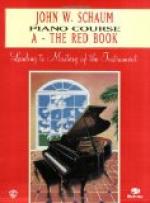ESSENTIALS OF PIANISM
Little by little I began to realize the essentials of effective piano playing were these: clear touch, intelligent phrasing, all varieties of tone, all the force the piano would stand, together with the greatest delicacy and the utmost speed. These things the artists possessed as a matter of course, but the ordinary student or teacher failed utterly to make like effects, or to play with sufficient clearness and force. What was the reason?
In due course I came under the supervision of various piano pedagogues. To the first I gave implicit obedience, endeavoring to do exactly as I was told. The next teacher said I must begin all over again, as I had been taught “all wrong.” I had never learned hand position nor independence of fingers—these must now be established. The following master told me finger independence must be secured in quite a different fashion from the manner in which I had been taught, which was “all wrong.” The next professor said I must bend the finger squarely from the second joint, and not round all three joints, as I had been doing. This so-called fault took several months to correct.
To the next I am indebted for good orthodox (if somewhat pedantic) ideas of fingering and phrasing, for which he was noted. The hobby of the next master was slow motions with soft touch. This course was calculated to take all the vim out of one’s fingers and all the brilliancy out of one’s playing in less than six months. To the next I owe a comprehension of the elastic touch, with devitalized muscles. This touch I practised so assiduously that my poor piano was ruined inside of a year, and had to be sent to the factory for a new keyboard. The next master insisted on great exactness of finger movements, on working up velocity with metronome, on fine tone shading and memorizing.
THE DESIRE FOR REAL KNOWLEDGE
Such, in brief, has been my experience with pedagogues and teachers of the piano. Having passed through it (and in passing having tried various so-called and unnamed methods) I feel I have reached a vantage ground upon which I can stand and look back over the course. The desire to know the experience of the great artists of the keyboard is as strong within me as ever. What did they not have to go through to master their instrument? And having mastered it, what do they consider the vital essentials of piano technic and piano playing? Surely they must know these things if any one can know them. They can tell, if they will, what to do and what to avoid, what to exclude as unnecessary or unessential and what to concentrate upon.
The night Rubinstein’s marvelous tones fell upon my childish ears I longed to go to him, clasp his wonderful hands in my small ones and beg him to tell me how he did it all. I now know he could not have explained how, for the greater the genius—the more spontaneous its expression—the less able is such an one to put into words the manner of its manifestation. In later years the same impulse has come when listening to Paderewski, Hofmann and others. If they could only tell us exactly what is to be done to master the piano, what a boon it would be to those who are awake enough to profit by and follow the directions and experiences of such masters.




